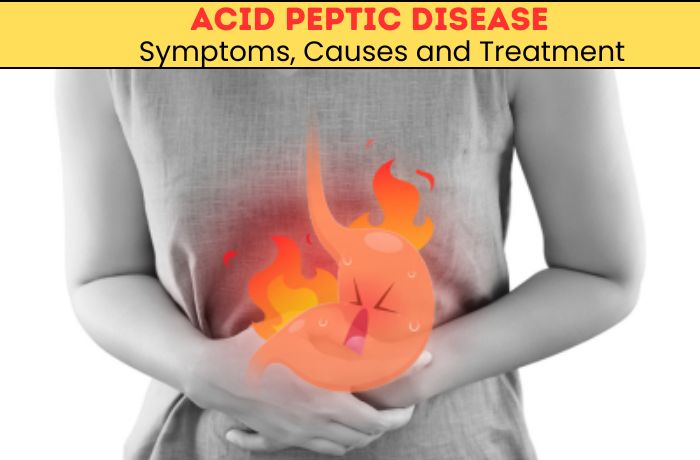
- May 20, 2024
Acid Peptic Disease: Symptoms, Causes and Treatment
Acid Peptic Disease (APD) refers to a spectrum of disorders affecting the stomach and first part of the small intestine, primarily characterized by the presence of peptic ulcers. These conditions result from an imbalance between digestive acids and the protective functions of the lining of the gastrointestinal tract. The primary disorders in this category include gastric ulcers, duodenal ulcers, and gastroesophageal reflux disease (GERD).
Why Should You Care About APD?
APD is more than just occasional heartburn. If left untreated, it can lead to serious complications such as ulcers, bleeding, and even perforation (a hole in the stomach lining). These complications can be life-threatening and require immediate medical attention.
Conditions under the APD
- Peptic ulcers: These are open sores that develop in the lining of the stomach (gastric ulcers) or duodenum (duodenal ulcers).
- Gastritis: This is inflammation of the stomach lining, often caused by H. pylori infection or irritation from NSAIDs (pain relievers such as ibuprofen).
- Gastroesophageal reflux disease (GERD): This occurs when stomach acid backs up into the esophagus, the tube that connects the mouth to the stomach, causing a burning sensation in the chest (heartburn).
Abdominal Pain
The most common symptom of APD is a burning or gnawing pain in the upper abdomen. This pain is often described as a dull ache or a sharp, stabbing sensation.
It typically occurs between meals or at night when the stomach is empty. Eating food or taking antacids may temporarily relieve the pain.The pain is usually localized in the epigastric region but may radiate to the back.
Heartburn
A burning sensation in the chest, often rising to the throat, is commonly known as acid reflux.
Associated Factors: This symptom is worsened by lying down or bending over and may be triggered by certain foods and drinks, such as spicy foods, alcohol, and caffeine.
Bloating and belching
Belching is often accompanied by a feeling of fullness or swelling in the abdomen. This may be due to the buildup of gas as a result of impaired digestion or increased acid production.
Bloating can be uncomfortable and may result in a visible bulge in the abdomen.
Nausea and vomiting
These symptoms can vary from mild nausea to severe, projectile vomiting.
Nausea may occur in the morning or after meals. Vomiting, especially if it contains blood (hematemesis) or material that looks like coffee grounds, indicates a more serious ulcer or possible complication.
Causes
Helicobacter pylori Infection
Helicobacter pylori (H. pylori) is a gram-negative bacterium that colonizes the stomach lining and causes chronic gastritis and peptic ulcers. This infection is the most common cause of APD. The bacterium damages the mucosal barrier by producing enzymes such as urease, which converts urea to ammonia, neutralizing stomach acid and allowing the bacteria to survive.
NSAIDs:
The use of nonsteroidal anti-inflammatory drugs (NSAIDs) such as aspirin and diclofenac can prevent the production of prostaglandins, which protect the stomach lining, by blocking the enzyme cyclo-oxygenase, leading to bleeding and ulcers.
Excessive gastric acid secretion
Conditions that result in increased gastric acid secretion may predispose individuals to APD. One such condition is Zollinger-Ellison syndrome, a rare disorder characterized by gastrin-secreting tumors (gastrinomas) that cause excessive acid production. Even in the absence of such syndromes, certain lifestyle factors such as stress and consumption of large amounts of spicy foods or caffeine can increase gastric acid secretion and contribute to mucosal damage.
Lifestyle Factors
Diet: Spicy foods, caffeine, and alcohol can irritate the stomach lining and increase acid production. Although these factors alone are not usually enough to cause ulcers, they can aggravate existing conditions and contribute to symptoms.
Smoking: Nicotine increases gastric acid secretion and reduces bicarbonate production and blood flow to the stomach lining, impairing mucosal defenses.
Treatment
- Antibiotics: If an H. pylori infection is found, your doctor will prescribe a combination of antibiotics to eradicate the bacteria. This greatly reduces the risk of ulcer recurrence.
- Antacids: These medicines provide quick relief from heartburn by neutralizing the stomach acid already present. However, they don’t promote ulcer healing and must be taken frequently for lasting relief.
- Proton pump inhibitors (PPIs): These are the mainstay of treatment for APD. PPIs effectively reduce stomach acid production by blocking the action of enzymes involved in acid secretion. This promotes ulcer healing and relieves symptoms such as heartburn and indigestion.
- Histamine (H2) blockers: H2 blockers are another class of medications that decrease stomach acid production but are not as effective as PPIs. They are often used for short-term relief or when PPIs are not tolerated.
- Surgery:Surgery is rarely needed for APD, but may be considered for severe complications such as bleeding ulcers or perforation (hole in the stomach or duodenum).
Expert Care in Pune: Dr. Suresh Jain
Seeking expert medical care for acid indigestion is paramount. Dr. Suresh Jain, a renowned gastroenterologist in Pune with over 20 years of experience, is a leading figure in the treatment of gastrointestinal disorders. His extensive expertise and patient-centered approach ensure complete and compassionate care. Dr. Jain is dedicated to using the latest advances in gastroenterology to provide the best possible outcomes for his patients.
For more information or to book an appointment with Dr. Suresh Jain,
Conclusion
Acid peptic disease is a group of gastrointestinal disorders caused primarily by an imbalance between acid secretion and mucosal defense. With proper diagnosis and a complete treatment plan, including medications, lifestyle changes and, in some cases, surgery, most patients can achieve significant symptom relief and prevent complications. Regular follow-up is essential to monitor the condition and adjust treatment as needed.
